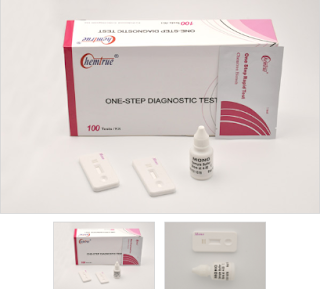Cardiac Troponin I/CK-MB/Myoglobin Rapid Test
Test results: 15 minutes
Sensitivity:1ng/ml, 5ng/ml, 50ng/ml respectively
Specimen: whole blood/Serum/Plasma
Long shelf life: 24 months at room temperature
Cardiac Troponin I /CK-MB/Myoglobin √CE Marked
cTnI is a cardiac muscle protein in heart to play a fundamental role in the transmission of intracellular calcium signal actin-myosin interaction. The level of cTnI is below 0.06ng/ml in average in healthy people. cTnI is released rapidly into blood stream soon after the onset of acute myocardidal infarction (AMI). Levels of cTnI remains elevated for up to 6-10 days. The level of cTnI may reach 100-1300ng/ml in some AMI patients, which makes it a specific marker for diagnosis of AMI patients.
CK-MB is an enzyme also present in the cardiac muscle. The release of CK-MB into the blood following an AMI can be detected within 3-8 hours after the onset of symptoms. It peaks within 18-24 hours, and returns to baseline within 48-72 hours.
Myoglobin is a heme-protein normally found in skeletal and cardiac muscle. It is responsible for transporting oxygen within muscle cells. When muscle cells are injured. Myoglobin is released into the blood rapidly due to its relatively small size. The level of Myoglobin increases measurably above baseline within 1-3 hours following injury, peaking at 3-8 hours, and returning to baseline within 24-36 hours.
Chemtrue® One-Step Cardiac Troponin I, CK-MB, Myoglobin Test are immunochromatography based one step in vitro test, designed for qualitative detection of cardiac troponin I (cTnI), CK-MB, Myoglobin in human whole blood, serum or plasma specimens.
Test results: 15 minutes
Sensitivity:1ng/ml, 5ng/ml, 50ng/ml respectively
Specimen: whole blood/Serum/Plasma
Long shelf life: 24 months at room temperature
Application Range: Emergency Treatment, CCU, ICU and Department of Cardiology, Clinical Laboratory



评论
发表评论